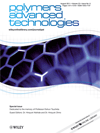Sulfonic acid polymer–densely grafted poly(ethersulfone)s for a highly proton-conducting membrane
Abstract
Proton-conducting polyelectrolytes were prepared by densely grafting novel sulfonic acid polymers, poly(styrenesulfamide acid) (PSA) and poly(vinylsulfonic acid) (PVS), on the azo-initiator-modified poly(ethersulfone) (PSU). The grafted PSUs provided both a high ion-exchange capacity (IEC) and a good membrane formability. The proton-conductivities of the PSA-g-PSU and PVS-g-PSU membranes were 8.2 and 21 mS cm−1, respectively, at 90°C under a hydrated condition, and 4.1 and 1.7 mS cm−1, respectively, at 150°C under a nonhumidified condition. The latter conductivities were significantly higher than that of Nafion® 117 (0.03 mS cm−1 at 150°C), which was ascribed to both the strong acidity of the graft chains even under the water-free state and the high IEC of the densely grafted membrane. They remained constant for over 1 week at 150°C. Copyright © 2011 John Wiley & Sons, Ltd.




